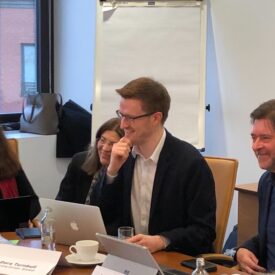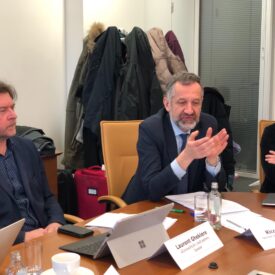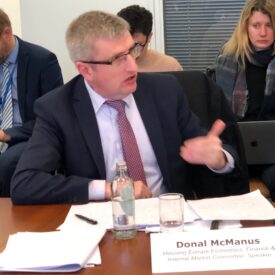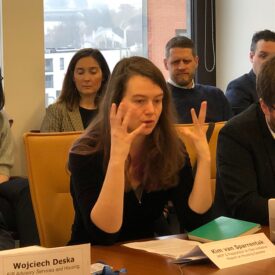On March 5th, Housing Europe co-organised a workshop session with the European Investment Bank (EIB) on European sustainable finance on the housing sector under the title “From Objectives to Action – Turning EU Social & Environmental Policy into positive change for citizens”. We’ve put together a summary of the highlights below. At the bottom of the page, you may also access all presentations held during the event.
The session, held on the EIB Brussels office, kicked-off with MEP Kim Van Sparrentak (Greens, the Netherlands), Donal McManus (Housing Europe Chair on Economics & Finance) and Riccardo Maggi (Member of European Commission’s Vice-President, Frans Timmermans’ Cabinet) setting the policy context.
Kim Van Sparrentak, currently rapporteur of the European Parliament upcoming own initiative report on “Decent and Affordable Housing for All”, focused on the financialisation of the housing market and the impact the housing crisis is having on the middle classes. She stressed that there is a risk for the “Renovation Wave” to become a “Renoviction Wave” where a rise in the housing prices lead to gentrification and social exclusion.
Donal McManus, on the other hand, highlighted the decreasing support from government on housing in many European countries where the EIB and the European Commission will have to play a key role in bridging the social and environmental objectives of the new Green Deal and increase public investment to tackle market failures in the housing system.
Riccardo Maggi gave an overview on the policy objectives of the new Green Deal buildings at the crossroads of the carbon neutral challenge. He urged renovation work to happen at a higher rate than up until now. Maggi also took the opportunity to express the will of Franz Timmermans’ cabinet to listen to all stakeholders’ innovative thinking to bring the strategy forward, in his own words “if we don’t get this right neither our carbon-based economy nor our welfare state will survive”.
Then, Dara Turnbull, Research Coordinator at Housing Europe, presented the current results of the study commissioned to Housing Europe by the EIB on “Forecast of Investment Needs for Refurbishment and New Construction in Europe”. Some of the conclusions drawn from the research suggest that 40 per cent of the social housing stock was built 50 years ago, most of the investment will be focus in new construction, and future investments in social housing in the upcoming 10 years will be around 3 million housing units. But most importantly, energy efficiency will be one of the main drivers for investment in renovation.
From the beneficiaries’ perspective of EU funding and assistance, Sven van Elst of VHH – Flemish Social Housing Federation explained how VVH is installing solar panels on social housing units to help 100.000 tenants decrease energy bill and increase production of clean energy with EIB support via the ELENA programme. In the long term, a self-sustainable model is the goal, using part of the energy savings. Martien Post of Gewobag – Public Housing Company of Berlin on the rental cap system in Berlin through a cooperation agreement with the government. Post sketched the housing affordability challenges that Berlin faces and how their instruments are in need of both strong political backing and the help of funding schemes like the ones of the EIB. Maria José Villegas of Málaga Vivienda gave an insight on Malaga challenge to control a housing system that is overburdened by tourist accommodation and where rental housing is not affordable for a society greatly hit by the economic crisis and scarce.
From the institutional perspective, Andrea Colantonio and Wojciech Deska intervened on behalf of the EIB to stress the importance of aligning EIB activities to the Paris Climate Agreement and beyond just energy renovation, but focusing at other relevant components within the lifecycle of buildings such as water usage and building materials. The EIB is working towards the de-financialisation of the housing market in order to prevent speculation so they are becoming stricter on the conditions of their loans. In fact, the EIB has started financing smaller housing associations through the “right to buy offer” and are looking at the cities where pilots are being tested. In order to access EIB investments the energy standards of the housing stock need to comply with their respective national legislation.
Olga Martínez from the European Commission Directorate General for Employment mentioned InvestEU and the ERDF as key funding instruments supporting social housing investments. They believe that housing is at the start of development for the most vulnerable groups in key areas such employment and health.
Finally, some key experiences from the ground included the newly launched European City Facility to support cities to accelerate the implementation of their energy action plans and insights from the Estonian Housing Europe Member, EKYL as presented by its chair, Andres Jaadla on how to increase the speed of deep renovation in buildings through pre-fabricated renovated building elements.
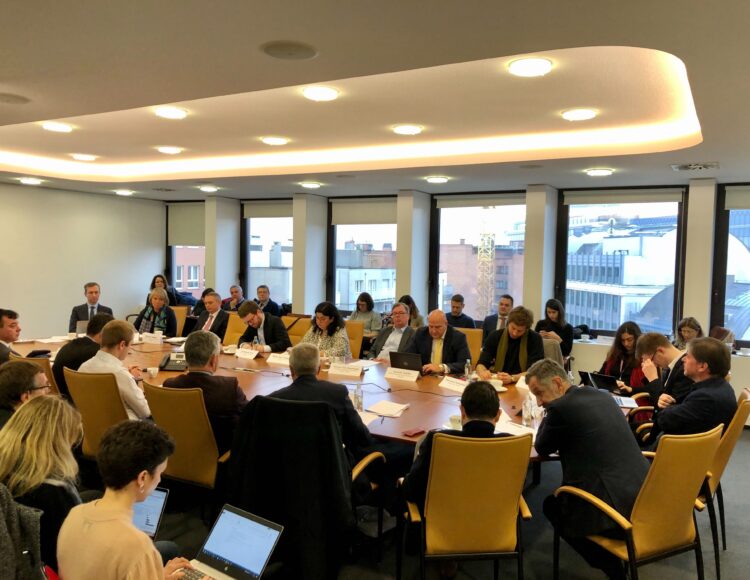
-275x275.jpg)
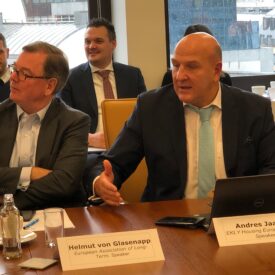
-275x275.jpg)
